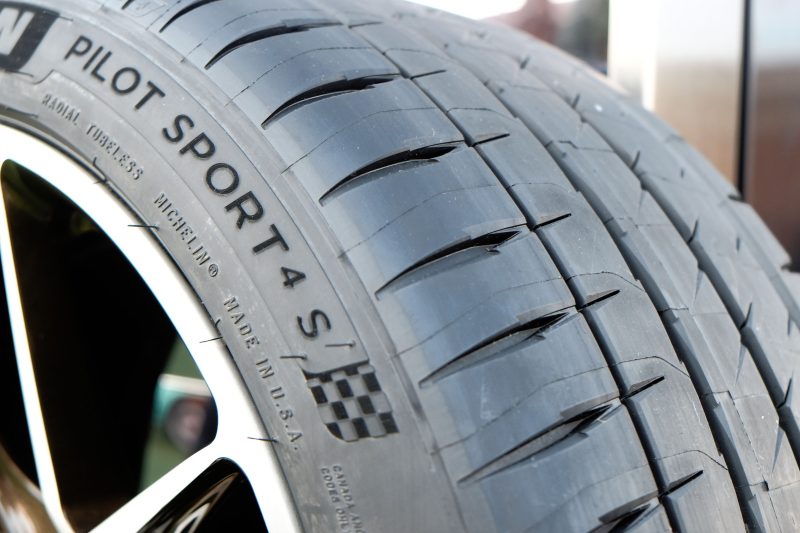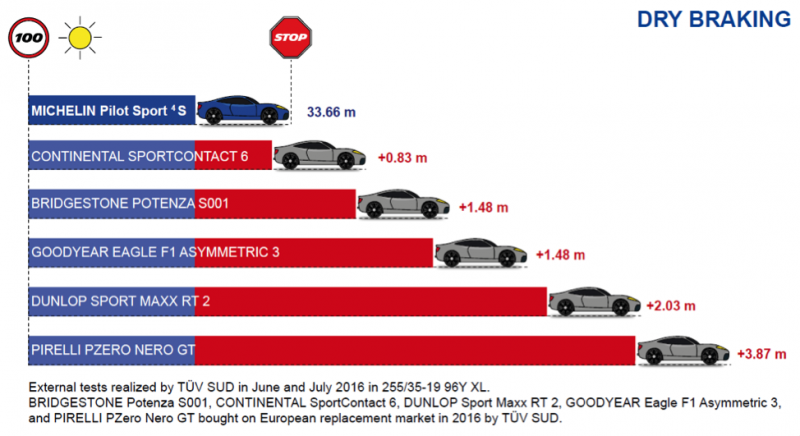We have a close relationship with Michelin. Project Boxster uses a Michelin Pilot Sport Cup 2, Michelin has brought us to launches in the past, and we are working with Michelin on additional projects for the future. To launch the new Michelin Pilot Sport 4 S, the replacement for the vaunted Pilot Super Sport, Michelin brought us to Palm Springs, California. The launch centered around The Thermal club; a private race course which is among the longest in the United States. Our introduction to the new tire included a three hour street drive through Joshua Tree, an autocross session, and some track time at the Thermal Club’s North Palm Circuit.

The new Michelin Pilot Sport 4 S
Why Replace the Pilot Super Sport?
The rest of the industry is still playing catch-up to the Pilot Super Sport. Despite the fact that the PSS has been on the market since 2010, it remains the industry standard for Ultra-High Performance tires. Until the PS4S launches in March the PSS will remain at the top of the Ultra-High Performance category in dry braking, wet braking, and dry lap times. The PS4S is designed to pull this lead out even further. Improvements in compound, loading and tread design give the PS4S a marked advantage over its predecessor in every category. Though initially coming to the States only in 19″ and 20″ sizes, the Pilot Sport 4 S will eventually replace the Pilot Super Sport entirely.

The Pilot Sport 4 S and the Formula E tire are very similar. Without the two red lines, the two would be hard to tell apart at a glance.
Michelin’s motorsport partnerships are important to the development of their Ultra-High Performance tires. In most applications however, series rules permit a particular type of tire for a particular condition. For example, in endurance racing, if it starts to rain the car will come off slicks and move to rain tires. Michelin’s partnership with Formula E offers a different set of challenges which are much more akin to street tires. Formula E is a single-tire series, and all cars use the same tire regardless of conditions. The tire sizes used in Formula E(where an 18″ wheel is used, rather than a 13″ wheel as in Formula 1), are also much more akin to those used on road cars. The two tire samples above represent the PS4S and the Formula E spec tire. Can you tell the two apart easily?
Defined By Motorsports
The tire sample at the right in the previous picture came from Formula E. Like the Pilot Super Sport and the PS4S, the Formula E tire uses a wet compound across the inner 80% of its section width, and a dry compound in the outer 20%. In the words of Michelin compound designer Laurent Huc; “compound differences matter more in the wet, wet conditions are the real equalizer.” Michelin has found that devoting a greater percentage of the tire to wet performance than dry improves safety and performance without sacrificing ultimate grip in a street tire. Compared to the PSS, the new tire is designed to distribute loads more evenly under all conditions using Variable Contact Patch technology. This improvement is a large part of the tire’s improvements in cornering, braking and stability.

Ultra-High Performance tires don’t only supply ultimate grip, they also need to work at very high speeds. As speeds increase the tire wants to centrifugate, or expand radially from the axis of rotation. Product engineer Carl Driver(who has the best possible name for someone in his position), introduced us to Michelin’s new nylon textile belt material, which gives the tire its strength. Unlike many other tire manufacturers, Michelin makes its tire-building equipment in-house, and develops its own proprietary belt materials, elastomers and other tire components.

Where the Rubber Meets the Road
Unfortunately for us here at Flatsixes, Porsche demo cars were not used at this launch. To test the new tire, Michelin gave each of us seat time in a variety of other high performance cars, including the new Audi R8, Ferrari California T, Mercedes C63 AMG, BMW M4 and BMW 340i. The day was broken into several parts, including a police-escorted tour through Joshua Tree, a track session at The Thermal Club’s North Palm course, and an autocross.
The journalists, Youtubers and other media split into two groups. My group was taken on a high speed tour of Joshua Tree first thing in the morning, rotating from car to car about every hour. The tour allowed us to see how the PS4S performed on the road. We found that the new tire offered exceptional grip and stability at all speeds, from the parking lot through triple digits. Though we were on public roads, our police escort allowed us to see some frankly astounding speeds through the beautiful Joshua Tree scenery.
Torture Testing the Michelin Pilot Sport 4S
The second half of the day included a track session at the North Palm course, along with an autocross. The track session was a lead-follow in BMW M3s, led by a pro driver in an M2. The North Palm Circuit offered a wide variety of conditions for a short course, including a 250 degree banked corner, fast esses, and a tight 180 degree corner with very late apex. An autocross session using BMW 340i’s followed the track driving. Despite my relative inexperience(my only autocross ever was done in my 1998 VW Golf), I acquitted myself fairly well, with a time comfortably in the top 10.
For a tire, the autocross was truly torture testing. 48 of us ultimately split our sessions between just two cars. Braking distances stayed consistent all day, and none of the competitor’s tires best stops equaled the Michelin’s average stopping distance from 60 miles per hour.

Unlike the other stages of testing, the autocross included the Michelin tire along with its competitors. Driven back to back with other tires in the category, the Michelin truly showed its mettle. The Michelin offered much more direct steering feel, better transitional behavior and better braking than each of its two competitors I was able to sample. My current Porsche 944 runs a Bridgestone UHP tire, mostly because tire choices in 16″ are limited. This experience will see me switching to both a larger wheel and a Michelin tire as soon as possible.
Details are available via Michelin, with prices starting at $233 per tire.
